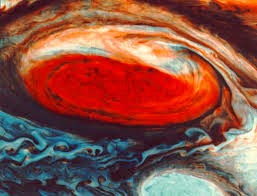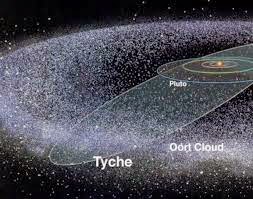Thursday, 4 December 2014
A Vast, Multi-Faceted Fictitious Universe
Sure enough, there were two interesting outcomes. First, a routine google search for the Great Red Spot on Jupiter disclosed that current understanding of this phenomenon differs from Flandry's, published in 1959. The Red Spot is not after all a red kind of ice. Secondly, something said by Flandry while on the Red Spot initiated a discussion of attitudes to death and even to me quoting Dylan Thomas.
The moral of this story is that Poul Anderson's History of Technic Civilization is a vast multi-faceted fictitious universe and that, as with the real universe, it is possible to reflect on reality and life as they are focused through historical events and through the biographies of historical figures.
Two further points about death:
I prefer Dylan Thomas' "And Death Shall Have No Dominion."
"And death shall have no dominion.
"Dead men naked they shall be one
"With the man in the wind and the west moon;
"When their bones are picked clean and the clean bones gone,
"They shall have stars at elbow and foot..."
This is relevant here because that last quoted line gives us the title of Volume I of James Blish's future history.
Secondly, I recently referred here to a conversation between Flandry and Aycharaych. I could have added that this conversation discloses Aycharaych's attitude to death: it is "'A completion.'" (Sir Dominic Flandry, p. 164)
"Call no man happy until he is dead" (see here) I think means that a life must be complete before it can be evaluated although, in Volume I of James Blish's theological trilogy, a medieval monk presents the safer Scholastic interpretation: the dead man is happy in Heaven.
Aycharaych's philosophical cynicism is displayed yet again when later he sets out to "complete" Flandry's life.
Wednesday, 3 December 2014
Kinds Of Ice
a black allotrope on the Jovian surface;
super-dense ice in the mantle around the Jovian core;
red crystalline ice floating in the Jovian atmosphere.
The Red Spot is a storm according to Wikipedia (see here) but "'...a mass of aerial pack ice...'" (Sir Dominic Flandry, p. 185) according to Dominic Flandry. Hence, the fourth kind of ice listed here.
In the Technic History:
"'...always, Chives, the Red Spot is a pack of flying glaciers, stretching broader than all Terra. And we've been crashed on one of them!'" (ibid.)
- crashed in a vehicle protected by a force-field although the field may fail in the dense, violent atmosphere and, in any case, food and air will run out unless Flandry and Chives can attract help which, of course, they do.
It was interesting to find a link to the Red Spot only to discover that it gives a different account of this phenomenon but that is the relationship between science and science fiction. The science moves on. The fiction moves with it but, if earlier fictions were worthwhile, then they are still appreciated, with their earlier versions and visions of the Solar planets.
It is on this occasion that Flandry says:
"'I don't want to die so fast I can't feel it. I want to see death coming, and make the stupid thing fight for every centimeter of me.'" (p. 184)
For those of us who disbelieve in a hereafter, this is an intriguing thought. We can die in our sleep or can be killed instantaneously by an explosion. In these cases, we do not realize that our last moment of consciousness is our last. Like Flandry, I would prefer to see death coming but would not, at the very end, want to fight it. Life's limits, its beginning and its end, are not "stupid."
Dylan Thomas wrote, "Rage, rage against the dying of the light." I do not want to die enraged.
Friday, 6 October 2017
Sky Gods And Avalon
Ganymedean Outlaws worship Jupiter:
"...at the full now, sprawling tremendously across heaven, the Red Spot like a single watching eye." (p. 73)
They say:
"'God is in Jupe and Jupe is in God...'" (ibid.)
How many gods have been in the sky?
I think that the seven "planets" (Sun, Moon, Mercury, Venus, Mars, Jupiter and Saturn) and their corresponding deities were originally identical;
in Anderson's World Without Stars, an extragalactic race regards our galaxy as God;
Niven's and Pournelle's Church of Him is founded when light suddenly appearing in a dark nebula looks like God opening an eye.
In Anderson's Genesis, Jupiter's "...Red Spot faded away ages ago." (Part Two, III, p. 124)
How did gods come down to Earth?
"Christian recalled myths of men who were the lovers of goddesses or who tramped the roads and sat at humble meat with God Incarnate." (Genesis, Part Two, X, 5, pp. 226-227)
A goddess having intercourse with a man and the one God incarnate as a man: two very different divine-human interactions. Another two kinds were miraculous interventions and poetic/prophetic/scriptural inspiration. Christian looks back from a very remote future.
An Outlaw says that an Engineer's spacesuit is:
"'Not Ganny make...'Mebbe they be really from Earth.' He spoke as a man at home might have spoken of Avalon." (Ganymede, p. 76)
"Avalon," an evocative name, is doubly so for Anderson fans. See here.
Saturday, 3 September 2022
On Jupiter
On Jupiter, Flandry hears:
"...the eternal snarling of a wind which would have blown down any city men could build..." (p. 179)
We ought to pause on such phrases rather than just speed past them.
When the ship carrying Flandry and Chives has crashed on a floating iceberg in the Red Spot of Jupiter:
"The floor shook. It banged and crashed outside. A fog of free radicals drifted green past the window, and the red iceberg spun in Jupiter's endless gale." (p. 188)
OK: an endless gale; a red iceberg spinning around in the gale; on the berg, a wrecked ship; in the ship, Flandry and Chives in the classic scenario of fictional heroes facing death but devising a clever, last-minute escape...
Chapter VI opens with Flandry's report:
"- And in that well-worn nick of time..." (ibid.)
Dig it.
Saturday, 11 July 2020
Back To The Solar System
After a billion or so years:
the Sun is brighter, whiter and slightly blue;
"The rings of Saturn were tattered and tenuous." (p. 124);
one Jovian moon has become rings;
the Red Spot is gone;
Mars has lost its moons and its axis has shifted;
natural forces have eroded most human artifacts.
After only three million years, Larry Niven's Corbell and Peerssa find bigger changes but that is because there has been planetary engineering. The most interesting of these changes are:
the sun is a red giant;
Mars is moonless;
what looks like Earth is in orbit around what looks like Jupiter.
They do not know whether they are in the right planetary system!
Friday, 1 December 2017
Life On Jupiter
Differences:
a fall is more serious on Jupiter, even for a Jovian;
under Jovian gravity, the change of air pressure with altitude is several times greater than on Earth - a mile above sea level, Theor's spiracles get less than half the hydrogen that they need;
erosion and gravity counteract orogeny so that most mountains are low;
energies bursting out of the compressed core and mantle cause not only quakes, volcanoes and geysers but also a thirty thousand mile long permanent storm, the Red Spot.
Wednesday, 10 February 2021
Flandry And Chives On Jupiter
We Claim These Stars, CHAPTER V.
"A blurred green shape said: 'You aneurine, sir,'" (p. 31)
The blurred green shape is Chives, Flandry's Shalmuan servant, and, of course, he says, "Your aneurine, sir."
Their Ymirite guide, Horx, has abandoned them in the Red Spot area, leaving them to die either when the spaceship in which he had been transporting them succumbs to its battering by the Jovian environment or when their food and air run out.
Chives exemplifies that kind of humor in which he, a native of Shalmu, deplores the kind of unsportsmanlike behavior that is only to be expected from "'...a native.'" (p. 33) In Citizen Khan, when Mrs Khan says that they need a plumber for the bathroom and that the neighbor knows a good Polish man, Mr Khan replies, "Not Polish! We must support British workers! I'll get a Pakistani..." (Keep it up, Khan! We love our Poles and Pakistanis.)
Two things have to happen:
Flandry solves the problem of how to escape from their predicament;
after thinking about it, he has a moment of realization -
"'Wait a minute!'" (p. 34)
He does learn something from the expedition:
Thursday, 22 January 2015
Journey And Arrival
Saturn's rings are depleted;
one Jovian moon has disintegrated into rings;
the Red Spot is gone;
Mars has lost its moons and tilted its axis;
the Sun is larger, whiter and brighter;
the solar wind is stronger;
ultraviolet has increased;
antimatter plants near the Sun and trans-Plutonian comet harvesters either were dismantled or have eroded;
some minerals on Venus are now molten;
Luna has lower mountains, newer craters and ground collapsed on empty cities;
Earth is almost entirely cloud covered, with glimpses of water and land but no ice or lights;
Gaia greets Wayfarer but there I end for today.
Tuesday, 17 December 2019
The Alice Tradition
Tatiana Thane calls her native Aenean tadmouse "Frumious Bandersnatch."
Chunderban Desai called his native Ramanujan pet "Mock Turtle."
See also:
The Red Queen's Race, 13 Feb '19
The Red Queen's Race, 11 Nov '18
Gyres
Red King, White King, Last Viking
As ever, those are more links than I expected to find and someone will spot it if I have missed any.
Tuesday, 22 February 2022
Does God Intervene?
When Havig recounts how circumstances thwarted his attempts to change the past, Robert Anderson asks:










